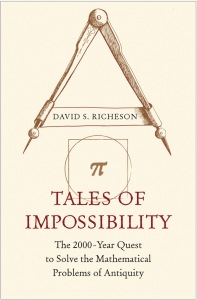I’m very excited to announce that my new book, Tales of Impossibility: The 2000-Year Quest to Solve the Mathematical Problems of Antiquity (Princeton University Press, 2019), is now available! (OK. It was published about a month ago, but I am just now getting around to blogging about it.)
 Like my previous book, Euler’s Gem (Princeton University Press, 2008), Tales of Impossibility is a historical tale that spans more than two millennia. It is about the famous problems of antiquity—squaring the circle, trisecting an angle, doubling the cube, and constructing regular polygons. These compass-and-straightedge problems were posed by the ancient Greeks and were proved impossible 2000 years later. The book is accessible to anyone who loves mathematics.
Like my previous book, Euler’s Gem (Princeton University Press, 2008), Tales of Impossibility is a historical tale that spans more than two millennia. It is about the famous problems of antiquity—squaring the circle, trisecting an angle, doubling the cube, and constructing regular polygons. These compass-and-straightedge problems were posed by the ancient Greeks and were proved impossible 2000 years later. The book is accessible to anyone who loves mathematics.
If you would like to find out more about the book. You can listen to this recent interview in the New Books Network podcast, read this short interview with Princeton University Press, or read this excerpt from the book that appeared in Lapham’s Quarterly.
Below is the official blurb about the book and some of the nice things that mathematicians have written about it. I hope you enjoy it! If you read it and enjoy it, please leave a positive review on Amazon, Goodreads, or wherever you bought the book!
———————————
A comprehensive look at four of the most famous problems in mathematics
Tales of Impossibility recounts the intriguing story of the renowned problems of antiquity, four of the most famous and studied questions in the history of mathematics. First posed by the ancient Greeks, these compass and straightedge problems—squaring the circle, trisecting an angle, doubling the cube, and inscribing regular polygons in a circle—have served as ever-present muses for mathematicians for more than two millennia. David Richeson follows the trail of these problems to show that ultimately their proofs—demonstrating the impossibility of solving them using only a compass and straightedge—depended on and resulted in the growth of mathematics.
Richeson investigates how celebrated luminaries, including Euclid, Archimedes, Viète, Descartes, Newton, and Gauss, labored to understand these problems and how many major mathematical discoveries were related to their explorations. Although the problems were based in geometry, their resolutions were not, and had to wait until the nineteenth century, when mathematicians had developed the theory of real and complex numbers, analytic geometry, algebra, and calculus. Pierre Wantzel, a little-known mathematician, and Ferdinand von Lindemann, through his work on pi, finally determined the problems were impossible to solve. Along the way, Richeson provides entertaining anecdotes connected to the problems, such as how the Indiana state legislature passed a bill setting an incorrect value for pi and how Leonardo da Vinci made elegant contributions in his own study of these problems.
Taking readers from the classical period to the present, Tales of Impossibility chronicles how four unsolvable problems have captivated mathematical thinking for centuries.
“This engaging and well-written book covers more ground than previous books on the classical improbability problems. Numerous historical asides add to the enjoyment of this work. Highly recommended!”
—Eli Maor, author of Music by the Numbers
“Tales of Impossibility presents an absorbing account of the history and mystery of problems whose infeasibilities are woven into the architecture of mathematics itself. Richeson shows us that what is not possible can be just as inspiring as what is. All math lovers will find gems to mine here.”
—Francis Su, author of Mathematics for Human Flourishing
“Tales of Impossibility is the story of a mathematical treasure hunt, and it’s a treasure chest in its own right. Inside are nifty proofs, historical surprises, tasty miscellany, and most of all, the rich mathematical narrative of a quest that has consumed geniuses and eccentrics alike. This is the history of math’s greatest tease—and it is immensely satisfying.”
—Ben Orlin, author of Math with Bad Drawings
“Tales of Impossibility contains mathematics that is interesting and perhaps new to most readers. The book features helpful diagrams and footnotes, quotations that amplify the subject matter, and even funny material here and there.”
—William Dunham, author of The Calculus Gallery
“Richeson has put together a fascinating account of mathematical impossibility, focusing on the ruler and compass problems of the ancient Greeks. This is a story of the problems and the people involved—but even more so of the changes in mathematical thinking that made it possible to prove impossibility.”
—Henry Segerman, Oklahoma State University
“Tying together Lincoln, Napoleon, dramatic duels, and amazing intellectual achievements spanning more than two millennia, Tales of Impossibility presents a terrific story. Even while unfolding some of the oldest and most familiar logical challenges, Richeson uncovers intriguing ideas and details that will be new to all readers, even the most mathematically experienced.”
—Glen Whitney, founder of the National Museum of Mathematics